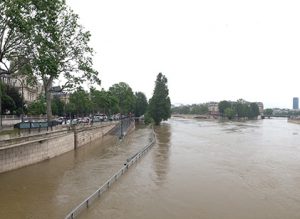
The concept of imaginative fatigue in the Anthropocene presents a kind of heady platform for lighting into all kinds of literary corruption and gatekeeping issues that are holding the rising waters in place, out of view or at least off the page:
This makes itself evident in the paucity of fiction devoted to the carbon economy, something the Brooklyn-based Indian writer Amitav Ghosh addresses in his marvelous recent book, The Great Derangement, writing, “When the subject of climate change occurs . . . it is almost always in relation to nonfiction; novels and short stories are very rarely to be glimpsed within this horizon.” Ghosh, who has depicted the precarious ecology of the Sundarban mangrove forests of Bengal in his novel, The Hungry Tide, says that this absence has to be “counted as an aspect of the broader imaginative and cultural failure that lies at the heart of the climate crisis,” a failure so pervasive that he calls our era, “which so congratulates itself on its self-awareness . . . the time of the Great Derangement.”
I agree with the reviewer that any discussions about the ‘ravages of the carbon economy’ would necessarily include story lines on the failure of capitalism. And talk about a contrivance. Who would believe that? Perhaps at no point have we ever been so self-hemmed in – constrained by our own no-go areas. Does any writer today imagine Zola or Hugo, or Anatole France or, good grief Racine, adhering to such constraints? Is it only fear? Will the publishers and agents love us no longer? What then? Asking for a friend of the fate of the world.
Image: Author photo of the flooded Seine, June 2016.
